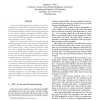Free Online Productivity Tools
i2Speak
i2Symbol
i2OCR
iTex2Img
iWeb2Print
iWeb2Shot
i2Type
iPdf2Split
iPdf2Merge
i2Bopomofo
i2Arabic
i2Style
i2Image
i2PDF
iLatex2Rtf
Sci2ools
147
click to vote
PERCOM
2005
ACM
2005
ACM
Security Parallels between People and Pervasive Devices
Unique and challenging security problems arise due to the scarcity of computational, storage, and power resources in the low-cost pervasive computing environment. Particularly relevant examples of resource-constrained systems are low-cost Radio Frequency Identification (RFID) systems. Surprisingly, the computational abilities of low-cost pervasive devices like RFID tags are similar to another pervasive, weak computing "device": people. Neither low-cost pervasive devices nor people can efficiently perform public-key or even symmetric cryptographic operations. Neither can store long random strings nor devote too much time or energy to security protocols. Both may need to authenticate themselves over a public channel to an untrusted terminal, without any outside help or external devices. Because of these similarities, pervasive security may benefit by adapting techniques from humancomputer security, or vice versa. This article treats RFID tags as a model for other lowcost perva...
Low-cost Pervasive Computing | Low-cost Pervasive Devices | Low-cost Pervasive System | PERCOM 2005 | Wireless Networks |
Related Content
| Added | 24 Dec 2009 |
| Updated | 24 Dec 2009 |
| Type | Conference |
| Year | 2005 |
| Where | PERCOM |
| Authors | Stephen A. Weis |
Comments (0)

